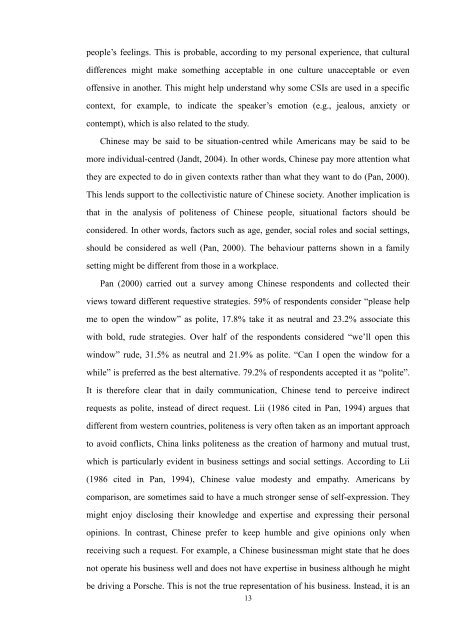View - Scholarly Commons Home
View - Scholarly Commons Home
View - Scholarly Commons Home
Create successful ePaper yourself
Turn your PDF publications into a flip-book with our unique Google optimized e-Paper software.
people‟s feelings. This is probable, according to my personal experience, that cultural<br />
differences might make something acceptable in one culture unacceptable or even<br />
offensive in another. This might help understand why some CSIs are used in a specific<br />
context, for example, to indicate the speaker‟s emotion (e.g., jealous, anxiety or<br />
contempt), which is also related to the study.<br />
Chinese may be said to be situation-centred while Americans may be said to be<br />
more individual-centred (Jandt, 2004). In other words, Chinese pay more attention what<br />
they are expected to do in given contexts rather than what they want to do (Pan, 2000).<br />
This lends support to the collectivistic nature of Chinese society. Another implication is<br />
that in the analysis of politeness of Chinese people, situational factors should be<br />
considered. In other words, factors such as age, gender, social roles and social settings,<br />
should be considered as well (Pan, 2000). The behaviour patterns shown in a family<br />
setting might be different from those in a workplace.<br />
Pan (2000) carried out a survey among Chinese respondents and collected their<br />
views toward different requestive strategies. 59% of respondents consider “please help<br />
me to open the window” as polite, 17.8% take it as neutral and 23.2% associate this<br />
with bold, rude strategies. Over half of the respondents considered “we‟ll open this<br />
window” rude, 31.5% as neutral and 21.9% as polite. “Can I open the window for a<br />
while” is preferred as the best alternative. 79.2% of respondents accepted it as “polite”.<br />
It is therefore clear that in daily communication, Chinese tend to perceive indirect<br />
requests as polite, instead of direct request. Lii (1986 cited in Pan, 1994) argues that<br />
different from western countries, politeness is very often taken as an important approach<br />
to avoid conflicts, China links politeness as the creation of harmony and mutual trust,<br />
which is particularly evident in business settings and social settings. According to Lii<br />
(1986 cited in Pan, 1994), Chinese value modesty and empathy. Americans by<br />
comparison, are sometimes said to have a much stronger sense of self-expression. They<br />
might enjoy disclosing their knowledge and expertise and expressing their personal<br />
opinions. In contrast, Chinese prefer to keep humble and give opinions only when<br />
receiving such a request. For example, a Chinese businessman might state that he does<br />
not operate his business well and does not have expertise in business although he might<br />
be driving a Porsche. This is not the true representation of his business. Instead, it is an<br />
13

















